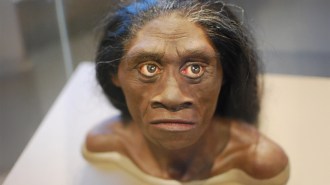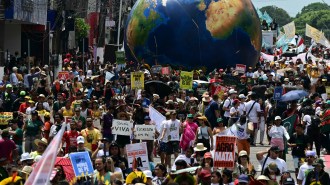Climate science: Credibility at risk, scientists say
SAN DIEGO – Publication of hacked emails exchanged by climate scientists. News accounts of problems in vetting data used in climate-assessment reports. Charges by critics that scientists won’t release their raw data so that others might independently vet published analyses of climate trends. Taken together, these events have marred the reputations of climate scientists, the Intergovernmental Panel on Climate Change and perhaps science generally.
Or so concluded a distinguished panel of science luminaries on February 20. They included Ralph Cicerone, president of the National Academy of Sciences; James McCarthy, a Harvard climate scientist and chairman of the board of directors of the American Association for the Advancement of Science; Nobel Prize winner Phillip Sharp of MIT, who co-chaired the NAS report last year: “Ensuring the Integrity, Accessibility, and Stewardship of Research Data in the Digital Age;” and Astronomer Royal Martin Rees, President of Britain’s Royal Society.
They spoke as part of a “late-breaking” session at the AAAS annual meeting – one that was co-sponsored by the National Academy of Sciences. Its stated theme: ensuring the transparency and integrity of science. However, its organizers conceded that what prompted them to shoehorn the session into the meeting were a series of back-to-back climate controversies that played out daily in news accounts over the past several months.
The “Climate-gate emails” and concerns over Himalayan glacial-melt data in a 2007 IPCC report together served as “sort of a wake-up call,” McCarthy said. But a wake-up call that he and others initially all but ignored.
The climate-science community, of which he is a part (he was a co-chair of an IPCC working group) largely dismissed the news revelations as accounts of bumbling behavior by well-meaning if overworked scientists. It didn’t appear “that this would be a very big deal for anyone,” McCarthy explained, because none of these revelations altered the weight of the evidence indicating that climate has been changing rapidly and that human activities appear to be fueling much of that change.
But in retrospect, he now says, complacency over those revelations “was wrong.” For many people not grounded in science, or at least not in climate science, “the question arose as to whether the validity – the robustness – of the underlying science relating to climate should now be called into question,” McCarthy acknowledges.
Ignoring public concerns over the emails and IPCC errors was a public relations blunder, he and others at yesterday’s panel said.
Then again, “Scientists are not very good at public relations,” observed Cicerone, an atmospheric chemist and climate scientist.
By not “stepping up” to defend the general strength of climate science in the wake of recent public challenges, the panelists acknowledged, bloggers and television pundits have been free to spin the revelations as evidence that most climate science is now suspect. And it most assuredly is not, the panelists maintained.
For instance, when a reporter asked what the scientists who were involved in the recent climate scandals did wrong, Rees responded: “We have no reason to believe they did anything wrong. . . . But of course the press coverage leads the public to believe we do need some reassurance.” And that is what several ongoing inquiries into the scandals is meant to do, he said. Offer reassurance that nothing is being swept under the rug – and likely demonstrate that any wrongdoing constitutes “a minor element in the overall climate-change-science scenario, which is crucially important in formulating public policy.”
Whether that is true for authors of the hacked emails, McCarthy was openly critical of the IPCC. There, he contends, something did go wrong.
Procedures exist to minimize the likelihood that weak or unvetted data are used or that their strength is exaggerated. External reviewers are supposed to pore over the details and point to questionable statements or data. And in the case of the Himalayan glacier-melt statements, McCarthy said that the reviewers did highlight apparent problems. These challenges were simply ignored.
Compounding the problem, he said, was the IPCC’s decision not to publicly air its dirty laundry. He said the group should have “put the reviews out and shown what happened. And said ‘we screwed up.’” Although McCarthy said he would have named every person involved, IPCC didn’t. “And I think that hurts the reputation of the institution.”
Sharp argued that “openness, transparency and collective scrutiny of data are the best ways to ensure that errors or fraud are discovered and corrected.” And because policymaking “is increasingly data driven and complex,” he said that every effort must be made to see that access to research data – by colleagues, critics or the public – remains largely unfettered. This is necessary to ensure the “integrity” of data and their interpretation.
Without openness in the collection and handling of data, Sharp said, people will have no way of ensuring the accuracy or validity of data. But access requires more than just handing over collections of numbers, computer files or photos. Sharp said it may also require providing “metadata” – ancillary information, such as precise descriptions of the equipment used to collect data, the computer programs used to process information, or the filters used to enhance or extract information.
That, of course, is precisely what some critics of climate science have been requesting. And questioning the integrity of that science when a researcher’s raw data have not been forthcoming.
The question, Gerald North of Texas A&M University wanted to know, “is just how much is enough?” One glaciologist he knows was asked to track down early glacial-melt data. Which, it turns out, were on the type of punched cards used in computers typical of the mid-1970s. The glaciologist couldn’t even remember where he might have packed away those boxes of cards.
Or maybe some data were analyzed by a now-obsolete program, like Fortran. Must a scientist find a copy of the program for a challenger, North asked – and teach him or her how to use it? And what if the challenger also wanted to probe influence on the interpretation of the data. Would it be reasonable, he asked, for that person to request that you turn over all emails ever exchanged between you and colleagues referring to the work?
Indeed, Cicerone charged, some climate scientists “are now receiving requests that are bordering on harassment.” They’re being asked, he said, for all of the data that went into a publication, sometimes in addition to all data analyses, all equations used in interpretations, detailed descriptions of all statistical techniques, all computer programs used – even access to any physical samples. These are fishing expeditions. And the demands they make, he said, often “are simply not feasible or are too costly.”
That’s why Cicerone called for the development of new standards and practices that define, by scientific discipline, what constitutes reasonable access to data.
But the big issue, all seemed to agree, is that public trust in climate science has suffered owing to the recent scandals. Said Cicerone: “I think there really is evidence of corrosion that has taken place in the public’s attitude toward climate [science].” He said public opinion polls in the United States and elsewhere also indicate distrust in this arena “has spilled over to other kinds of science.”
So what would the panelists do differently if a new climate scandal erupted tomorrow?
Not clear. And that’s the problem. Maybe it’s time for a climate-integrity summit where the research community rolls out an action plan. One that would dispatch a rapid-response truth squad to investigate alleged errors or misconduct. One that also, where appropriate, takes on closed-minded critics (as opposed to intellectually honest agnostics) and publicly drowns them with a tsunami of double- and triple-checked data.







